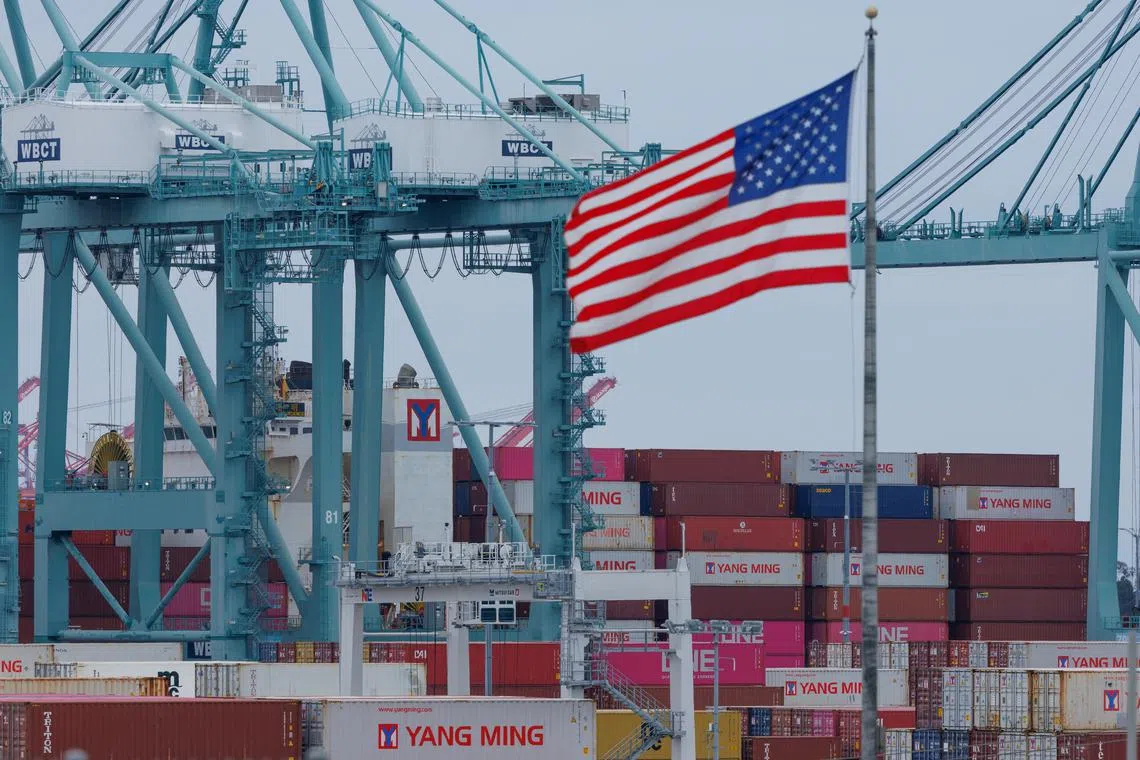US manufacturing contracts for second straight month as tariffs strain supply chains
Sign up now: Get ST's newsletters delivered to your inbox

US manufacturing contracted for a second straight month in April as tariffs on imported goods strained supply chains, encouraging some firms to lay off workers.
PHOTO: REUTERS
WASHINGTON – US manufacturing contracted for a second straight month in April as tariffs on imported goods strained supply chains, keeping prices at the factory gate elevated and encouraging some firms to lay off workers.
An Institute for Supply Management (ISM) survey on May 1 showed US President Donald Trump’s protectionist trade policy was hurting manufacturers. Tariffs were cited as problematic by respondents in every industry, with some taking issue with the disorderly manner in which the import duties were being imposed.
Mr Trump’s “Liberation Day” tariff announcement on April 2 ushered in sweeping duties on most imports from US trade partners, including a hike in duties on Chinese goods to 145 per cent, sparking a trade war with Beijing. But Mr Trump also suspended reciprocal tariffs against trade partners for 90 days.
“We expect the contraction for the manufacturing sector to deepen through the summer even if tariffs, especially those on imports from China, are eased soon,” said Mr Ben Ayers, senior economist at Nationwide.
The ISM’s manufacturing purchasing managers’ index (PMI) dropped to a five-month low of 48.7 in April from 49 in March. A PMI reading below 50 indicates contraction in the manufacturing sector, which accounts for 10.2 per cent of the economy. Economists polled by Reuters had forecast the PMI would decline to 48.
The PMI could have dropped more in April were it not for longer delivery times and higher inventory as factories sought to bring in more inputs to beat tariffs.
A lengthening in suppliers’ delivery times is normally associated with a strong economy, which would be a positive contribution to the PMI. But that is not the case this time.
“However, I would argue that the health of the factory sector is worse than the headline index would suggest,” said Mr Stephen Stanley, chief US economist at Santander US Capital Markets.
“The chaos around tariffs is causing a steep fall in activity, but at the same time producing longer delivery times and inventory accumulation.”
Manufacturing is heavily reliant on imported raw materials. The second straight monthly decline in the PMI ended a brief recovery in manufacturing that had been driven by hopes for a less stringent regulatory environment under the Trump administration and Federal Reserve interest rate cuts.
Makers of computer and electronic products reported that “all inbound Chinese shipments are on hold”, adding that “it is not feasible for our business or customers to sustain the pricing required to provide an acceptable margin”.
Machinery manufacturers said “tariff whiplash is causing us major issues with customers”. Some domestic producers were taking advantage of tariffs to raise prices. Makers of fabricated metal products noted that “domestic producers are charging more for everything because they can”.
Manufacturers of non-metallic mineral products reported that “strategic procurement and the supply chain are paralysed in a world that changes daily due to tariffs”.
The survey’s measure of prices paid by manufacturers for inputs edged up to 69.8, the highest level since June 2022, from 69.4 in March.
Factories continued to shed jobs, with Mr Timothy Fiore – who chairs the ISM’s Manufacturing Business Survey Committee – noting that “companies generally opted for layoffs because they are quicker to implement than attrition”.
But businesses in general have mostly adopted a wait-and-see attitude to the tariffs and are retaining their workforces, while remaining cautious about adding headcount.
A separate report from the Labour Department showed initial claims for state unemployment benefits jumped 18,000 to a seasonally adjusted 241,000 for the week ended April 26. Claims were boosted by school spring breaks in New York state.
Economists expect the tariffs to result in a wave of job losses. Expected to be a drag on domestic demand, the duties already are prompting some companies to reduce staff.
United Parcel Service (UPS) said this week that it would slash 20,000 jobs and shut 73 facilities as part of a planned reduction in deliveries for Amazon.com.
“While the labour market is far from recessionary territory, it could turn if other companies follow UPS’ suit and start trimming payrolls,” said Mr Andrew Stettner, director of economy and jobs at the Century Foundation. REUTERS


